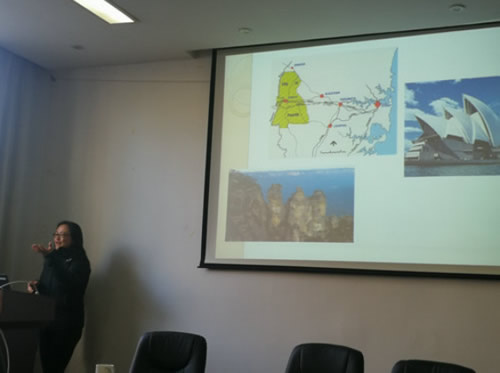Dr. Yingyan Zhang from Western Sydney University, Australia was invited to our school and gave an academic report entitled "Heat Conduction in Graphene-Polymer Nanocomposite" in the 210 meeting room of the college on the morning of December 29, 2018. The report was chaired by Associate Professor Han Yu, assistant to the dean of the School of Civil Engineering and Mechanics. Some teachers and graduate students of the School participated in this academic exchange.

In the report, Dr. Zhang mainly shared the interface heat transfer characteristics of graphene-polymer nanocomposites and their applications in high-performance electronic devices, and new methods for chiral screening of black phosphorus. Among them, Dr. Zhang gave a detailed introduction to his research group using molecular dynamics (MD) simulation to systematically study the heat transfer between graphene and nanocomposite polymer interface, as well as covalent and non-covalent functionalization, isotope doping and The influence of acetylene bond on graphene. The simulation results show that the covalent and non-covalent functionalization technology can significantly reduce the thermal resistance of the graphene-polymer interface in nanocomposites. Taking advantage of the strong anisotropic mechanical properties of black phosphorous nanoribbons, Dr. Zhang proposed a new efficient chiral screening method based on bending stiffness. This result immediately attracted the attention of the international academic community once it was published.
After the report, Professor Wang Chengyuan, Professor Tang Chun and the students on site had a lively discussion and exchange with Dr. Zhang. Dr. Zhang also detailed the specific problems encountered by the teachers and students of the Geotechnical Institute in molecular dynamics research. This report not only provides an opportunity for academic exchanges between teachers and students present, but also guides the direction of teachers and students in related research fields of our college.
Dr. Yingyan Zhang received her bachelor's degree from Dalian University of Technology in 2000, and her master's and doctorate degrees from the National University of Singapore in 2004 and 2008, and then stayed on as a post-doctoral researcher. She joined the University of Western Sydney in Australia as a lecturer in 2010 and has now been promoted to Senior Lecturer. Dr. Zhang's research directions include: numerical methods in solid mechanics; research on the mechanical properties of nanomaterials based on molecular mechanics and continuum models; molecular dynamics simulation of heat conduction in graphene and its composites. At present, 1 academic book, 4 monographs, and 73 journal articles have been published, which have been cited 3697 times, and the H factor is 31.
